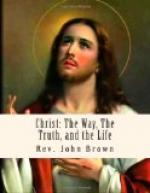Second. We hence learn, that under all these fits of deadness to which his people are subject, nothing without Christ will help: Not,
1. All their pains in and about ordinary means, prayer, reading, hearing, meditation, conference, &c. They will all cry out, that help is not in them: for he is the life.
2. Nor extraordinary duties, such as fasting and prayer, and vows,—these will never revive and quicken a drooping or fainting sickly soul: for they are not Christ, nor the life.
3. Nor will a stout courageous spirit and resolution of heart avail. If he who is the Life, breathe not, all that will melt away and evanish.
4. Nor will the stock of habitual grace which remaineth in the soul, be sufficient to quicken and revive the sick soul, if the Life breathe not on these habits; and if new influences of life and strength flow not in upon the soul, and new rays come not down from this Sun of Righteousness to warm the frozen soul, the habits will lie by as dead.
5. Far less will their great gifts and endowments help them out of that dead condition; all their light and knowledge, without the influences of this Life, will prove weak and insufficient for this end and purpose.
6. Nor will sound, pure and lively-like ordinances work out this effect; for till he look down, all these ordinances may prove dead and deadening to them.
It were good if believers were living under the conviction of this daily, and by their practice and carriage declaring if they believe, that Christ only is the Life, and that they must live in him, and be quickened and revived through him alone.
Third. We see hence, that Christ is the Life, that is, one that sufficiently, yea, and abundantly can help the believer while under those fits of deadness which have been mentioned, and the like. There is in him a rich supply of things that tend to revive, encourage, strengthen and enliven a soul under spiritual deadness and fainting. Therefore is he called the Life; as having in him all that which is necessary for and answerable to souls under spiritual sicknesses, distempers, desertions, fainting and swooning fits, &c., for with him “is the fountain of life,” Psalm xxxvi. 9; “and he it is that upholdeth the soul in life,” Psalm lxvi. 9; “and can command the blessing, even life for ever more,” Psalm cxxxiii. 3.
For further clearing of this, we would consider those things,
1. That he is God, equal with the Father in power and glory, and thereby “hath life in himself,” John v. 26; and can “quicken whom he will,” ver. 21. By this he proveth his own Godhead and equality with the Father; so, John i. 4, it is said, “that in him was life,” and that life was the light of men, whereby also his Godhead is confirmed. This should be firmly believed, and rooted in our hearts, as being the ground of all our hope, comfort, and life: For, were it not so, that our Mediator were the true God, all our hopes were gone, our comforts could not be long lived, and our life were extinct.




